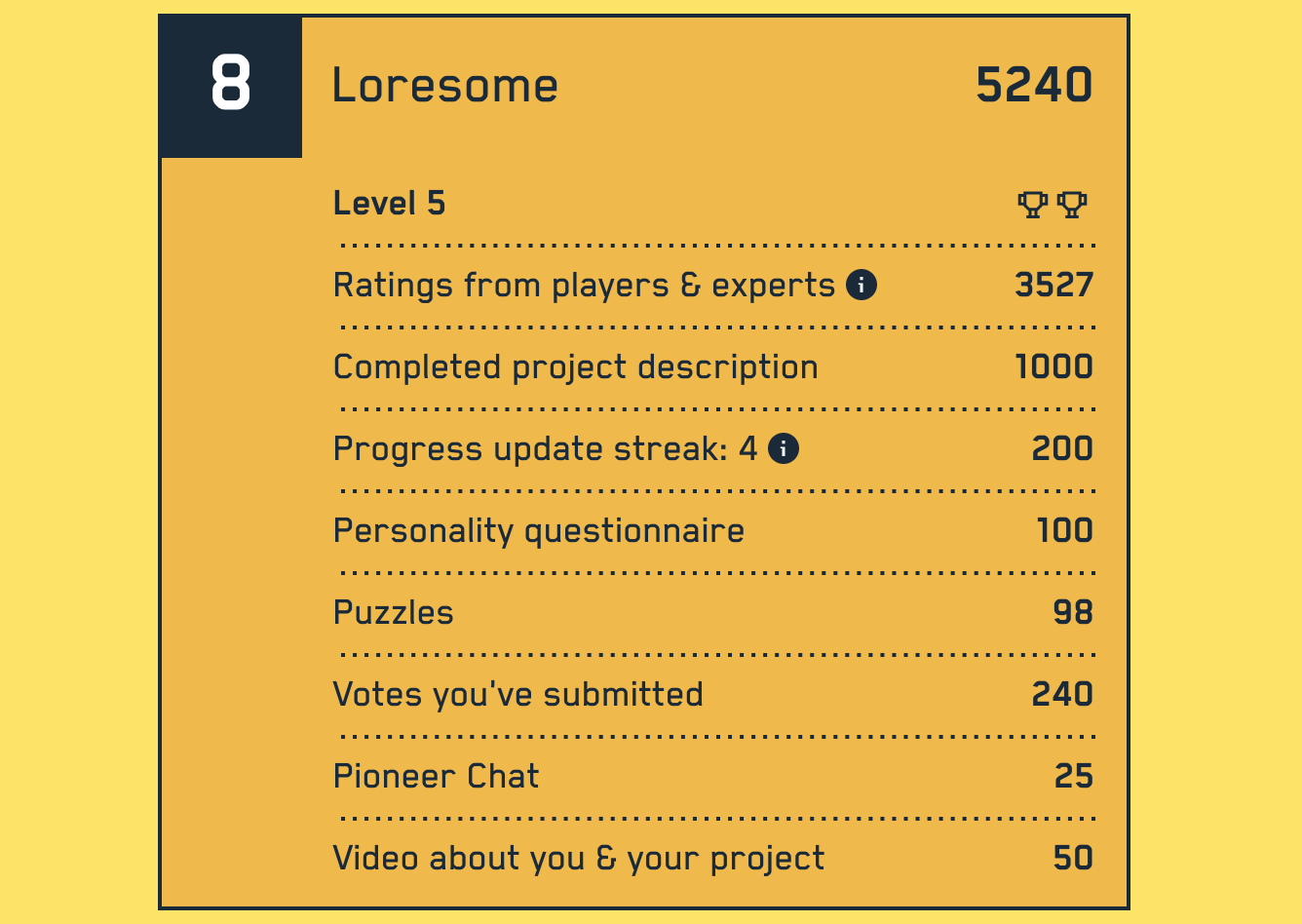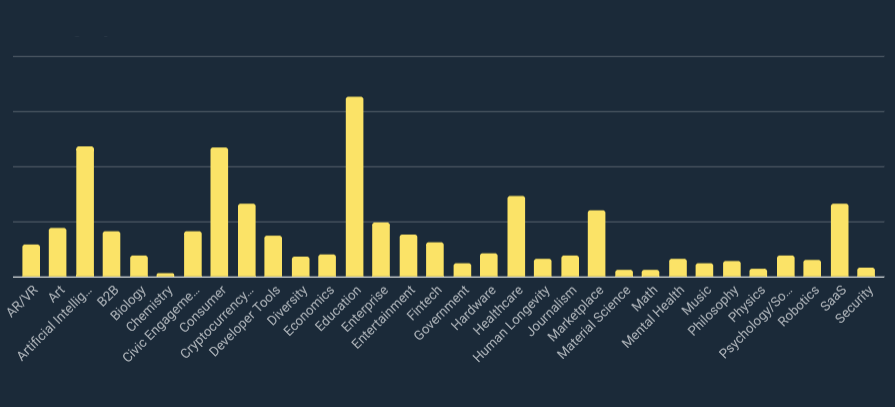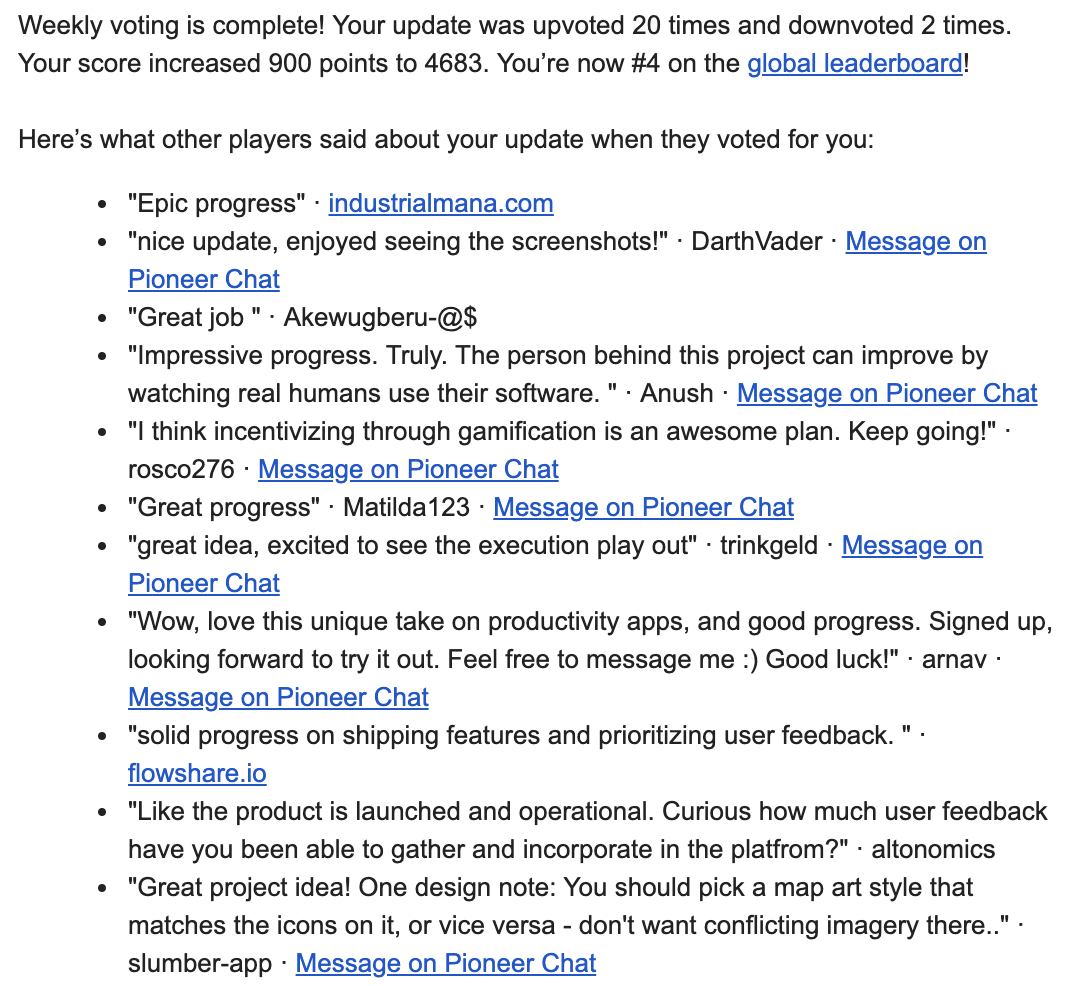How an online tournament can discourage the "finish next week"
Hello! I want to talk about an online competition for projects and startups, where I have been playing for the third month with Loresome as a project. This time was the most productive and focused not only in the life of the project, but, probably, in general in my life.
Summary of the article for those who have never had time: Pioneer is an online hackathon tournament that never ends; you file your project, write a report of 280 characters each week, vote for other participants, get feedback and motivation, communicate with other players from around the world in thematic chats. Finalists are awarded various bonuses and potential investors.

Pioneer is a gamified tournament and community for ambitious developers and creators of whatever. Previously, the championship was held in 4-week cycles, but has recently switched to an uninterrupted model. Makes the tournament Daniel Gross is a former partner of YCombinator.
You can participate from anywhere in the world, and with a project of any orientation: from academic research and art, to blockchain and AI. Here is the distribution of projects into categories a couple of weeks ago:

Education is the dominant category, most likely due to participating students and recent graduates who are always dissatisfied with the existing system ( I definitely was! ). Many projects in AI, medicine, and blockchain. But nobody is going to change the world especially with mathematics.
Having reached the end, the winners themselves become Pioneers (Pioneers?). This title is accompanied by many bonuses:
A complete list can be found here .
The logical question is - why do the organizers do this? The answer is to find the next unicorn and invest in it. Relevant clipping from the rules of participation:
But what if you are an artist or researcher, and you are not going to create any companies? Then you will receive all the prizes without any conditions at all:
Free translation: “we want to support everyone who changes the world for the better. But entrepreneurs have an advantage - they can earn money with their vocation. We hope that a small stake in their companies will help us support future generations of Pioneers. ”
The projects of past winners, like the winners themselves, are very diverse. Here are some examples from the last round (the age is indicated in parentheses):
Looking at the list of finalists of the winners, you can see that many of them are very young, and in the descriptions of the projects there are a large number of buzzwords. But there were exceptions.
The main weekly participation cycle looks something like this: on Sunday you send a progress report for the week, during Monday you vote for other participants, and on Tuesday you get points based on votes for your project. In addition to voting, points can be obtained for various tasks - “quests” - like uploading a one-minute video about your project, or connecting to a tournament chat on Discord.

The report has only three fields - a brief description of the project, progress for the week, and a plan for the next week - and all three have a limit on the number of characters.

Most often, participants use different hacks to contain more information and make the report more attractive:
 Bulletins
Bulletins
 +20 for specific metrics
+20 for specific metrics
 59% more emoji
59% more emoji
 Less words
Less words
 More bulletins Bit.ly
More bulletins Bit.ly
 links with screenshots and demos
links with screenshots and demos
After the end of voting, a letter arrives with the points earned and feedback from other players:


After getting into the top 100 of the global table, it becomes possible to select three mentor advisers and write them letters. For example, in the list of experts you can find stars such as Mark Andrissen and Stephen Wolfram. The organizers are trying to diversify the areas from which they invite experts, but most of them are now somehow connected with the Valley.
Pioneer is constantly experimenting with member chats on Discord. After connecting to the server (+25 points), the bot puts you in the “village” - a channel with 20-30 other players for communication on arbitrary topics. Previously, the distribution was random, now people are trying to group according to the similarity of projects.
Chatting supports motivation and, at times, brings random bonuses. I once asked for advice on hiring designers for freelance, and in response I got a link to the coolest design book I've come across - Refactoring UI.
The organizers also arrange additional activities - in the last tournament every week it was possible to ask live questions to the “expert of the week”; and the other day included broadcasting presentations of tournament finalists to investors in the Valley.
Participation in the tournament changed my approach to choosing goals and strategies for achieving them. When the reputation is at stake (in front of random people on the Internet, huh), the desire to “finish next week” and fix the “color of that button” magically disappears. I would never have gone through the hell of publishing the first app on the iOS Store in a week, if not for the tournament. Or here is a screenshot of the results of the week when I set myself the goal of “find new users and get a little feedback” (I’m still analyzing the feedback):

Advisers are one of the most interesting looking bonuses of the tournament, but my experience so far has been rather disappointing. For two tournaments, I wrote to four experts (+1 letter that should have been sent to several relevant people at once), but did not receive a single answer. Players in the chat rooms shared similar experiences (including those from the top 10).
Getting feedback every week is one of the most important factors for developing a project. The feedback in the tournament is different from what users would write, as the participants evaluate the development, and not just the visible product part.
Pioneer has an amazing effect on my progress with the project. Maybe it will work for you too! 280 characters is a small price for the motivation and focus that participation provides.
Learn more and register here .
Thanks for reading! You are awesome
Summary of the article for those who have never had time: Pioneer is an online hackathon tournament that never ends; you file your project, write a report of 280 characters each week, vote for other participants, get feedback and motivation, communicate with other players from around the world in thematic chats. Finalists are awarded various bonuses and potential investors.

About Pioneer
Pioneer is a gamified tournament and community for ambitious developers and creators of whatever. Previously, the championship was held in 4-week cycles, but has recently switched to an uninterrupted model. Makes the tournament Daniel Gross is a former partner of YCombinator.
You can participate from anywhere in the world, and with a project of any orientation: from academic research and art, to blockchain and AI. Here is the distribution of projects into categories a couple of weeks ago:

Education is the dominant category, most likely due to participating students and recent graduates who are always dissatisfied with the existing system ( I definitely was! ). Many projects in AI, medicine, and blockchain. But nobody is going to change the world especially with mathematics.
Prizes
Having reached the end, the winners themselves become Pioneers (Pioneers?). This title is accompanied by many bonuses:
- $ 1000 directly + $ 7000 equivalents (Stellar)
- $ 100k credits for Google Cloud and AWS
- Free Stripe Atlas Services
- Silicon Valley Tickets
- Industry Leadership Mentoring
A complete list can be found here .
Where is the catch?
The logical question is - why do the organizers do this? The answer is to find the next unicorn and invest in it. Relevant clipping from the rules of participation:
If you create a company from your project and raise money from investors, Pioneer will have the right to invest up to $ 100,000 alongside them. Our right will expire once we've invested $ 100,000 in the company, and it is capped at 20% of the round size (if others are investing $ 50,000, we'll invest at most $ 10,000).Translation: if the winners of the tournament create a company and attract investments (or win and attract to the already created one), Pioneer will have the right to participate in the investment round (with a limit of 20% of the round size and $ 100k total limit).
But what if you are an artist or researcher, and you are not going to create any companies? Then you will receive all the prizes without any conditions at all:
Many of our best Pioneers will be researchers, painters or musicians. Extremely successful people in many lines of work make the world better. But extremely successful entrepreneurs have a comparative advantage at making a lot of money while doing it. We hope that a small stake in their companies can fund future generations of Pioneers.
Free translation: “we want to support everyone who changes the world for the better. But entrepreneurs have an advantage - they can earn money with their vocation. We hope that a small stake in their companies will help us support future generations of Pioneers. ”
Winners of past tournaments
The projects of past winners, like the winners themselves, are very diverse. Here are some examples from the last round (the age is indicated in parentheses):
- Arun Johnson (18), USA: Exploring New Materials for Nuclear Energy
- Ahmed Moselhi (17) and Cameron Kerr (15), USA: AI-based personalized immunotherapy
- Karolis Šablauskas (27), Lithuania: automated ultrasound diagnostics of the heart
Looking at the list of finalists of the winners, you can see that many of them are very young, and in the descriptions of the projects there are a large number of buzzwords. But there were exceptions.
Ready player one
The main weekly participation cycle looks something like this: on Sunday you send a progress report for the week, during Monday you vote for other participants, and on Tuesday you get points based on votes for your project. In addition to voting, points can be obtained for various tasks - “quests” - like uploading a one-minute video about your project, or connecting to a tournament chat on Discord.

Report
The report has only three fields - a brief description of the project, progress for the week, and a plan for the next week - and all three have a limit on the number of characters.

Most often, participants use different hacks to contain more information and make the report more attractive:
Feedback
After the end of voting, a letter arrives with the points earned and feedback from other players:

Advisers

After getting into the top 100 of the global table, it becomes possible to select three mentor advisers and write them letters. For example, in the list of experts you can find stars such as Mark Andrissen and Stephen Wolfram. The organizers are trying to diversify the areas from which they invite experts, but most of them are now somehow connected with the Valley.
Chats and community
Pioneer is constantly experimenting with member chats on Discord. After connecting to the server (+25 points), the bot puts you in the “village” - a channel with 20-30 other players for communication on arbitrary topics. Previously, the distribution was random, now people are trying to group according to the similarity of projects.
Chatting supports motivation and, at times, brings random bonuses. I once asked for advice on hiring designers for freelance, and in response I got a link to the coolest design book I've come across - Refactoring UI.
The organizers also arrange additional activities - in the last tournament every week it was possible to ask live questions to the “expert of the week”; and the other day included broadcasting presentations of tournament finalists to investors in the Valley.
Personal feelings
Participation in the tournament changed my approach to choosing goals and strategies for achieving them. When the reputation is at stake (in front of random people on the Internet, huh), the desire to “finish next week” and fix the “color of that button” magically disappears. I would never have gone through the hell of publishing the first app on the iOS Store in a week, if not for the tournament. Or here is a screenshot of the results of the week when I set myself the goal of “find new users and get a little feedback” (I’m still analyzing the feedback):

Advisers are one of the most interesting looking bonuses of the tournament, but my experience so far has been rather disappointing. For two tournaments, I wrote to four experts (+1 letter that should have been sent to several relevant people at once), but did not receive a single answer. Players in the chat rooms shared similar experiences (including those from the top 10).
Getting feedback every week is one of the most important factors for developing a project. The feedback in the tournament is different from what users would write, as the participants evaluate the development, and not just the visible product part.
Conclusion
Pioneer has an amazing effect on my progress with the project. Maybe it will work for you too! 280 characters is a small price for the motivation and focus that participation provides.
Learn more and register here .
Thanks for reading! You are awesome
